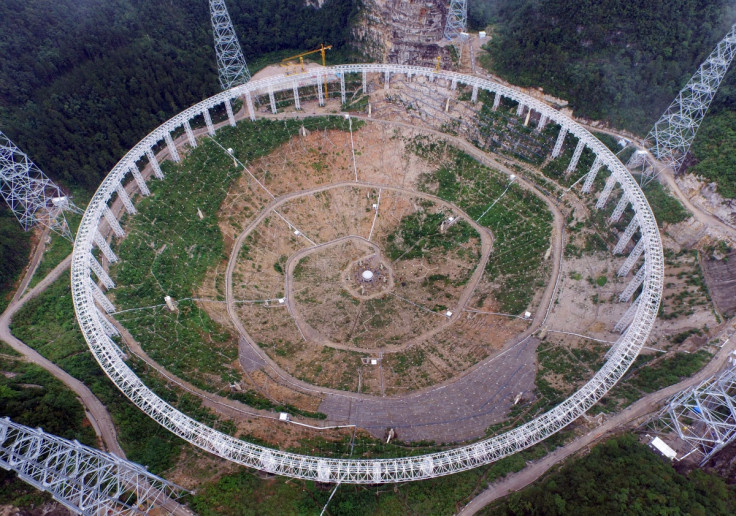China: 9,000 locals evacuated as plans for alien-detecting FAST telescope get green light

China is preparing to evacuate more than 9,000 people living near the construction site of the world's largest radio telescope. Authorities are planning to pay residents 12,000 yuan (£1,280) each to relocate at least 5km away from the Aperture Spherical Telescope, or FAST, to protect its electro magnetic wave environment.
According to China's Xinhua news agency, a total of 9,110 people in Pingtang and Luodian Counties will be moved away from the telescope by the end of September. Ethnic minorities with housing difficulties will get a 10,000 yuan subsidy from the provincial ethnic and religious committee.
Construction began on the FAST telescope in March 2011 at a cost of 1.2bn yuan. Once completed, it will span 500m in diameter – 200m bigger than the world's current biggest radio telescope, the Arecibo Observatory in Puerto Rico.
Disturbances to the electro magnetic wave current could potentially corrupt any results from the massive dish. Nan Rendong, chief scientist of the FAST project, explained: "A radio telescope is like a sensitive ear, listening to tell meaningful radio messages from white noise in the universe. It is like identifying the sound of cicadas in a thunderstorm."

Once operational, the telescope will be used to undertake a wide variety of research. It will cover two to three more areas of sky than the Arecibo telescope and will be used to better understand dark matter and dark energy, galaxy formation as well as look for pulsar observations.
Another task will be to use the telescope to search for messages from extraterrestrials. "Searching for Extra-Terrestrial Intelligence (SETI) is usually considered to be a high-risk task. However, if it succeeds, it will overshadow all other scientific achievements of mankind," FAST said in a statement.
"The only available way for communicating with civilizations on distant planets is to search for extra-terrestrial 'artificial' electromagnetic signals. The non-thermal Galactic background emission, quantum noise and cosmic microwave radiation are three noise sources that exist everywhere. Engineers in extra-terrestrial civilised societies also face a similar radio noise spectrum, and they might use the same microwave window as us."
In an interview with the South China Morning Post last year, scientists said that the telescope has the ability to detect extremely distant places. Astronomer Shi Zhicheng said: "If intelligent aliens exist, the messages that they produced or left behind, if they are being transmitted through space, can be detected and received by FAST."
© Copyright IBTimes 2025. All rights reserved.






















